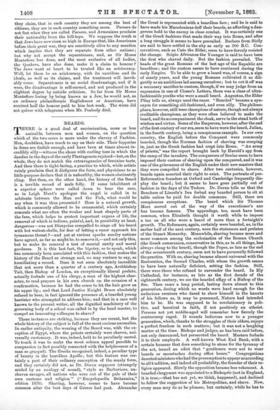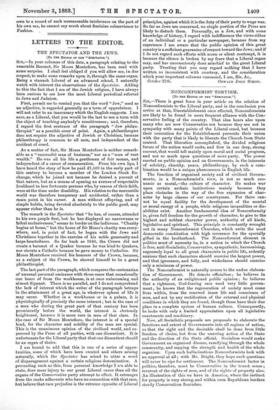BEARDS.
THERE is a good deal of recrimination, more or less amicable, between men and women, on the question which of the two sexes is more under the slavery of Fashion. Men, doubtless, have much to say on their side. Their fopperies in dress are foolish enough, and have been at times almost in- credibly silly—witness the shoes with curling toes in which the dandies in the days of the early Plantagenets rejoiced—but, on the whole, they do not match the extravagancies of feminine taste. And then there is tight-lacing, a practice to which, while artists vainly proclaim that it disfigures the form, and physicians to as little purpose declare that it is unhealthy, the women obstinately cling. But then, on the other hand, the history of the Beard is a terrible record of male folly. If some inhabitant of a superior sphere were called down to hear the case, as in Leigh Hunt's apologue the angel is called in to arbitrate between the Man and the Fish, what would he say when it was thus presented ? Here is a natural growth, which is commonly allowed to be ornamental, which certainly conceals what are often the weaker and least shapely parts of the face, which helps to protect important organs of life, the removal of which is tedious, painful, and, in possibility at least, dangerous—was not Dionysius compelled to singe off his beard with hot walnut-shells, for fear of letting a razor approach his tyrannous throat ?—and yet at various epochs sundry nations have agreed, as far as might be, to remove it,—and not only this, but to make its removal a test of mental sanity and moral goodness. It is this last fact, the bigotry, so to speak, which has commonly been associated with this fashion, that makes the history of the Beard so strange and, we may venture to say, so humiliating a record. Does it not seem absolutely incredible that not more than a quarter of a century ago, Archbishop Tait, then Bishop of London, an exceptionally liberal prelate, actually forbade one of his clergy, a man of the highest char- acter, to read prayers in his own church on the occasion of a confirmation, because he had the sense to let the hair grow on his upper lip ; and that Lord Justice Knight Bruce absolutely refused to hear, in fact ignored the presence of, a bearded young barrister who attempted to address him; and that in a case well known to the present writer, all the dignified machinery of the governing body of a school was called in by the head master, to compel an innovating colleague to shave ?
These instances are striking, because they are recent, but the whole history of the subject is full of the most curious anomalies. In earlier antiquity, the wearing of the Beard was, with the ex- ception of Egypt, where the priests certainly were shaven, uni- versally customary. It was, indeed, held to be peculiarly sacred. To touch it was to make the most solemn appeal possible to compassion (a fact possibly connected with the helplessness of a man so grasped). The Greeks recognised, indeed, a peculiar type of beauty in the beardless Apollo ; but this feature was cer- tainly a part of their ordinary conception of the manly form, and they certainly did not, as Dr. Doran supposes (strangely misled by an analogy of sound), " style as Barbarians, un- shaven savages, all nations who were out of the pale of their own customs and religion " (" Encyclopaedia Britannica," edition 1876). Shaving, however, seems to have become common after the best days of Greece had past. Alexander
the Great is represented with a beardless face ; and he is said to have made his Macedonians doff their beards, as affording a dan- gerous hold to the enemy in close combat. It was certainly one of the Greek fashions that made their way into Rome, and after a long struggle it seems to have prevailed. Barbers from Sicily are said to have settled in the city as early as 300 B.C. Con- servatives, such as Cato the Elder, seem to have fiercely resisted the change. Scipio Africanus the Younger is said to have been the first who shaved daily. But the fashion prevailed. The heads of the great Romans of the last age of the Republic are beardless ; and the custom seems to have continued during the early Empire. To be able to grow a beard was, of course, a sign of manly years, and the young Romans cultivated it as dili- gently as an ambitions lad among ourselves ; but to cut it off was a necessary sacrifice to custom, though, if we may judge from an expression in one of Cicero's Letters, there was a class of ultra- fashionable youths who wore a small beard. Augustus, the Elder Pliny tells us, always used the razor. "Bearded" became a syn- onym for something old-fashioned, and even silly. The philoso- phers, however, still were champions of nature, though not always creditable champions, as they were often believed to make the beard, and its accompaniment the cloak, serve in the stead both of wisdom and virtue. Some of the Emperors, however, after the end of the first century of our era, seem to have worn the beard, Julian, in the fourth century, being a conspicuous example. In our own country, the English before the Conquest were commonly bearded, though the Norman fashion of shaving was creeping in, just as the Greek fashion had crept into Rome. "An army of priests," was the report brought back by Harold's spy from the camp of the invaders. The conquerors of Senlac seem to have imposed their custom of shaving upon the conquered, audit was one of the grievances of the English under their new masters that they were compelled to shave. Alter two centuries, however, beards again asserted their right to exist. The portraits of pre- Reformation founders at Oxford and Cambridge frequently dis- play the beard ; but it seems to have gone partially out of fashion in the days of the Tudors. Dr. Doran tells us that the Benchera of Lincoln's Inn forbad any bearded person to sit at table unless he paid for double commons. Still, there are conspicuous exceptions. The beard which Sir Thomas More moved out of the way of the executioner's axe has become famous. The appendage, too, must have been common, when Elizabeth thought it worth while to impose a tax on all who wore a beard of more than a fortnight's growth. The Reformers, again, certainly were bearded, as, in the earlier half of the next century, were the statesmen and prelates of the Stuart Monarchy. Meanwhile, shaving became more and more common among the ecclesiastics of the Roman Church (the Greek communion, conservative in this, as in all things, has always clang to the beard); though the Popes, as late as the end of the seventeenth century, seem not to have personally followed the practice. With us, shaving became almost universal with the Restoration, the Second Charles, with whom the growth seems to have been naturally deficient, setting the fashion. Still, there were those who refused to surrender the beard. In Ely Cathedral, for instance, as late as the first decade of the eighteenth century, we see the bearded effigy of a Bishop of the See. Then came a long period, lasting down almost to this generation, during which no words were hard enough for the audacious creature who dared to show himself in the haunts of his fellows as, it may be presumed, Nature had intended him to be. He was supposed to be revolutionary in poli- tics, and heretical in faith, if not positively an atheist. Persons not yet middle-aged will remember how fiercely the controversy raged. It sounds ludicrous now to a younger generation, whichithanks to the struggles of their elders, enjoys a perfect freedom in such matters ; but it was not a laughing matter at the time. Bishops and judges, as has been said before, not only denounced, but persecuted the beard. Masters forbade it to their employes. A well.known West End Bank, with a certain humour that does something to atone for the tyranny of the act, issued an edict that " gentlemen were not to wear beards or moustaches during office hours." Congregations deserted ministers who had the presumption to appear as according to all tradition, and indeed all probability, the founder of their re- ligion appeared. Slowly the opposition became less vehement. A bearded clergyman was appointed to a Bishopric (not in England, it is true,—that has not yet, we think, happened), and declined to follow the suggestion of his Metropolitan, and shave. Now, every man may do as he pleases; but certainly, while he has to
9vrn to a record of such unreasonable intolerance on the part of his own sex, he cannot say mach about feminine subservience to Fashion.







































 Previous page
Previous page